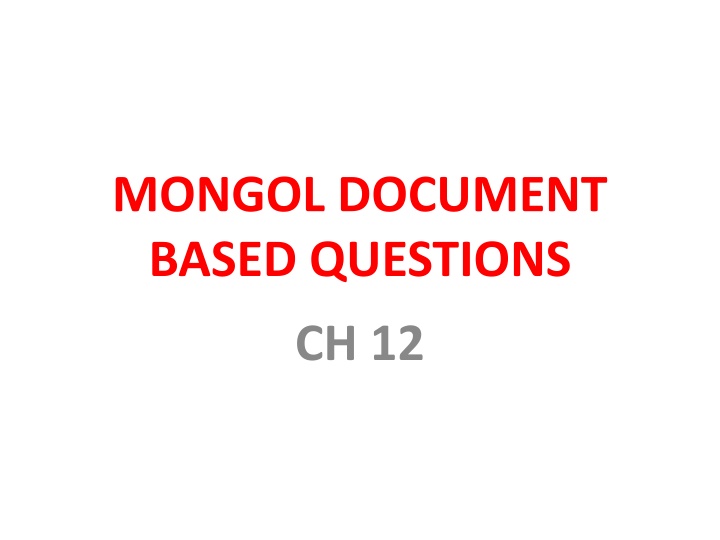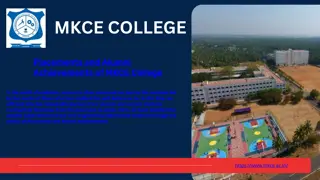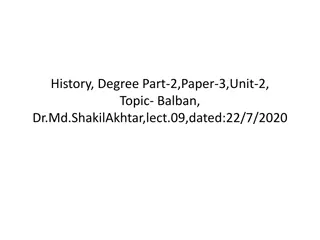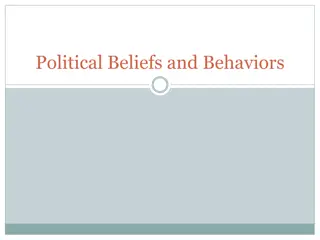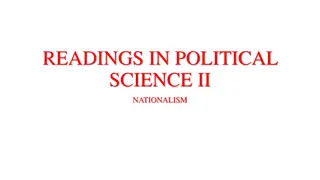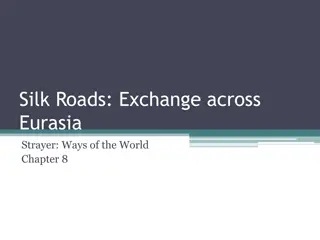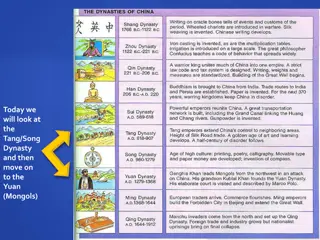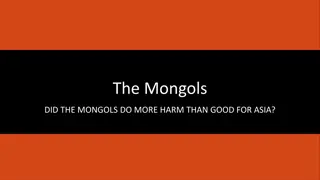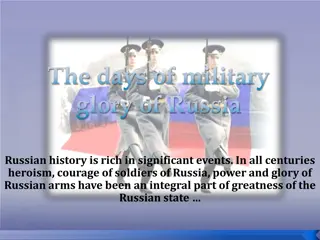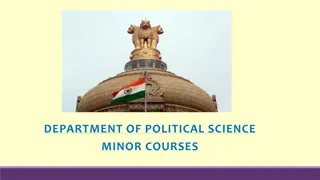Insights into Mongol History: Political Relationships and Achievements
Explore the dynamics of political authority and relationships among the Mongols through the Anda relationship, personal authority, and ritual exchanges. Discover Ogodei's greatest achievements and notable mistakes as well as Chinggis Khan's aspirations and self-image in shaping the Mongol empire. Uncover the secretive motivations behind meetings and the divine ambitions that defined Chinggis Khan's life's work.
Uploaded on Sep 28, 2024 | 0 Views
Download Presentation

Please find below an Image/Link to download the presentation.
The content on the website is provided AS IS for your information and personal use only. It may not be sold, licensed, or shared on other websites without obtaining consent from the author.If you encounter any issues during the download, it is possible that the publisher has removed the file from their server.
You are allowed to download the files provided on this website for personal or commercial use, subject to the condition that they are used lawfully. All files are the property of their respective owners.
The content on the website is provided AS IS for your information and personal use only. It may not be sold, licensed, or shared on other websites without obtaining consent from the author.
E N D
Presentation Transcript
MONGOL DOCUMENT BASED QUESTIONS CH 12
Document 12.1: Mongol History from a Mongol How would you describe the anda relationship? The anda relationship was a form of political alliance in pastoral societies. It drew on symbols of personal friendship, including gift exchanges, socializing, and sleeping in close proximity, to cement broader alliances between powers.
What does the Secret History suggest about the nature of political authority and political relationships among the Mongols? Political authority was personal rather than institutional in nature. Political relationships were also personal, and drew on ritual exchanges and socializing associated with personal friendships like the anda to cement them. They also involved oaths of fidelity and service in exchange for leadership and protection.
What did Ogodei regard as his greatest achievements and his most notable mistakes? Ogodei believed his greatest achievements were that he conquered China; established a network of post stations that sped up communications across the empire; had wells dug in the desert to create pasture and water for the people; placed spies and agents among all the people of the cities; and brought peace to the Nation and the people. He admits that his notable mistakes were that he let himself be conquered by wine; allowed himself to be convinced by a woman to break established principles by taking away the daughters of one of his uncles.
Document 12.2: A Letter from Chingghis Khan Why did Chinggis Khan seek a meeting with Changchun? He takes an interest in talented subjects. He is seeking worthy men to occupy high offices. He hopes to gain wisdom from a meeting. He hopes to perhaps learn the secret to preserving life (by which he may mean immortality).
How does Chinggis Khan define his lifes work? What is his image of himself? Chinggis Khan defines his life s work by his conquests, which were divinely sanctioned to create a world empire by seizing China, an inconstant state tainted by haughtiness and extravagant luxury. He presents himself as living simply eating and dressing as his herdsmen; as a man who hates luxury and exercises moderation; leads from the front in military affairs; and takes an interest in ruling his people and in finding talented officials to rule under him.
How would you describe the tone of Chinggis Khans letter to Changchun? What does the letter suggest about Mongol attitudes toward the belief systems of conquered peoples? The letter s tone is one of pride in his accomplishments, even though he seeks to downplay his pride in the letter, and also one of deference to Changchun and his learning. The letter suggests that Mongols were open to the teachings of their conquered peoples belief systems, and believed that the belief systems contained wisdom (and perhaps the secrets to an extended life) that Mongols could benefit from.
How do Documents 12.1 and 12.2 help explain the success of the Mongols empire-building efforts? Document 12.1 provides a sense of how political alliances were formed in Mongol society and how khans secured the allegiance of their followers; how Temujin became Chinggis Khan; and the personality and leadership style of Ogedei. It also provides insight into how Ogedei understood the empire and his conquests, and court life and court intrigue. Document 12.2 provides insight into how Chinggis Khan presented his conquests and himself, and his motivations and character. It reveals how he viewed wisdom traditions of conquered peoples; sought counsel and knowledge; and sought to administer his empire.
What core Mongol values do these documents suggest? Document 12.1 reveals that political alliances were personal in nature, based on trust and sealed with ritual exchanges and socializing. Other values include giving good counsel; respecting and rewarding those that served the khan loyally; and respecting established principle, as revealed when Ogodei regretted taking away the daughters of his uncle. Document 12.2 reveals that Mongols valued simplicity and moderation; and respected talent, learning, and personal military courage.
Document 12.3: A Russian View of the Mongols How did the Russian writer of the Chronicle account for what he saw as the disaster of the Mongol invasion? The Mongol invasion was a punishment by God for sinfulness.
Can you infer from the document any additional reasons for the Mongol success? The Russian princes failed to coordinate their resistance to the Mongols and frequently failed to send aid to each other. The Mongols had successful siege tactics, building stockades and using battering rams to good effect.
Beyond the conquest itself, what other aspects of Mongol rule offended the Russians? their demand for tribute their plunder of the towns their destruction of churches their massacring of urban populations
To what extent was the Mongol conquest of Russia also a clash of cultures? Russia was a settled agricultural society while the Mongols were a pastoral society. Russia was Christian; the Mongols were not.
Document 12.4: Chinese Perceptions of the Mongols Why might Menggu s children have requested such a document and asked a Chinese scholar to compose it? What does this suggest about Mongol attitudes to Chinese culture? Menggu s career was that of an administrator, a profession that the Mongols had no tradition of. Thus his children sought to honor him by drawing on the traditions of China where he served. In the administrative milieu in which his family lived, this was considered normal and served to strengthen the prestige of the family among its peers. The Mongols adopted some aspects of Chinese culture, particularly those for which they had no indigenous equivalent.
What features of Menggus governorship did this Chinese author appreciate? In what ways did Menggu s actions and behavior reflect Confucian values? What might the writer have omitted from his account? The Chinese author appreciated Menggu s enforcement of the law; his efforts to secure pardons for rebels; his efforts to alleviate famines and the burdens on commoners during times of dearth; and his lack of greed, as reflected in his failure to accumulate wealth. Menggu s actions were Confucian in that he selflessly served the emperor; looked after the interests of his social inferiors by enforcing the law, securing clemency for low- ranking rebels, and providing help to commoners during periods of famine. Also Confucian was his failure to use his position of authority for personal gain. This document was meant to extol the virtues of Menggu and therefore was likely to pass over any weaknesses in his character, his decisions, or his abilities.
What might inspire a highly educated Chinese scholar to compose such a flattering public tribute to a Mongol official? The Chinese scholar may have had an honest appreciation of Menggu s virtues and talents. He may have wanted an opportunity to curry favor with a powerful Mongol administrative family or to serve a patron. He may have written the account simply for personal gain.
Document 12.5: Mongol Women through European Eyes How does William of Rubruck portray the lives of Mongol women? What was the class background of the Mongol women he describes? Rubruck describes women s lives without passing explicit judgments, as when he notes that women took active roles in the day-to-day life of pastoral encampments by driving carts, setting up and taking down dwellings, milking cows, making butter and gruit, dressing and sewing skins, looking after sheep and goats, and making felt and covering the tents.
He also notes without judgment the hierarchy among wives of a single husband that was observed, and how this impacted the layout of their encampments; and the separate room for women in their husband s tent. Rubruck s description of Mongol marriage customs is more judgmental. In the selection he explains customs, including the purchasing of a bride, the ritual abduction of a new wife, and the sons taking their father s wives after his death. These accounts portray women as the daughters and wives of men. The class background of the Mongol women Rubruck describes are primarily elite, although he also mentions sewing girls. during the course of his career.
What do you think he would have found most upsetting about the position of women in Mongol society? The custom of one man having multiple wives runs against Christian customs. The custom of purchasing wives and the ritual kidnapping of one s wife may have offended him, as these were not common practices in Christian Europe. He explicitly expresses his revulsion at the custom of a son taking all of his father s wives (except for his own mother) upon the father s death
Based on this account, how might you compare the life of Mongol women to that of women in more established civilizations, such as China, Europe, or the Islamic world? Mongol women, like women in established civilizations, lived in a patriarchal society; they lived under the control of the men in their societies. The women were segregated from men, especially those from outside their family. However, because of the reality of pastoral life, Mongol women played different and in some ways more prominent roles in the life of the encampment than a woman in a settled society did in her community. This is especially true for the elite Mongol women Rubruck describes, who in settled societies would be largely cloistered from the world and would undertake few roles in the household.
